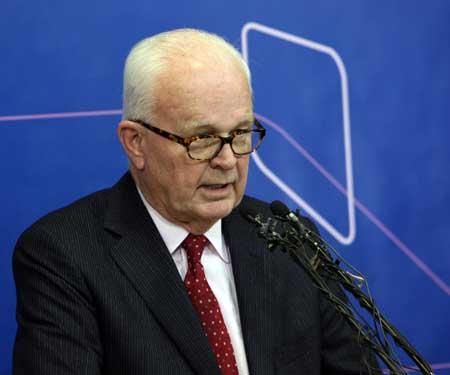U.S., DPRK agree on need to resume six-party talks: Bosworth
2009-12-10 21:15 BJT
SEOUL, Dec. 10 (Xinhua) -- Stephen Bosworth, U.S. special envoy to the Democratic People's Republic of Korea (DPRK), said Thursday that the U.S. and the DPRK reached a common understanding on the need for resuming the six-party talks and implementing the Joint Statement of September 2005.
 |
| Stephen Bosworth, U.S. special envoy to the Democratic People's Republic of Korea (DPRK), addresses a press conference in Seoul, capital of South Korea, on Dec. 10, 2009. Bosworth said Thursday that the U.S. and the DPRK reached a common understanding on the need for resuming the six-party talks and implementing the Joint Statement of September 2005. (Xinhua/He Lulu) |
At a press conference here after wrapping up his three-day trip to Pyongayang, Bosworth called the trip "very useful" in that he was able to exchange views in a "candid, business-like" way.
During the talks with DPRK's First Vice Foreign Minister Kang Sok-ju and Vice Foreign Minister Kim Kye-gwan, the U.S. envoy said he communicated to the officials U.S. President Barack Obama's view that "complete denuclearization of the Korean Peninsula is the fundamental undertaking of the six-party talks, if resumed."
"It remains to be seen when and how the DPRK will return to the six-party talks," he said, adding that the issue will require further consultations among six members of the talks.
Bosworth's meeting with DPRK top leader Kim Jong-il, however, was not realized, as the U.S. did not ask for it, Bosworth said.
Nor did he carry a special message from President Obama, he added.
Other sensitive issues, such as the DPRK's uranium enrichment and the inter-Korean summit, were not brought up during the talks, the U.S. envoy told the press, when inquired.
According to the U.S. envoy, his trip to Pyongyang was made in purpose of facilitating the resumption of the six-party denuclearization talks, as well as reaffirming the goal of fully implementing the Joint Statement of September 2005.
"It is important to point out that these were exploratory talks, not negotiations. It is certainly our hope, based on these discussions in Pyongyang, that the six-party talks can resume expeditiously and that we can get back to the important work of denuclearization," he said.
The two sides, however, did not share views on a follow-up bilateral meeting, Bosworth said when inquired whether there was a discussion on the timing and the level of additional meetings.
The remarks came after Bosworth met with high-ranking officials at Seoul's foreign ministry, including Foreign Minister Yu Myung-hwan and top nuclear negotiator Wi Sung-lac, in order to have discussions on the result of his trip.
Bosworth is scheduled to leave South Korea on Friday, flying for Beijing, Moscow, and Tokyo, in order to brief other members of the six-party talks on the results, and return back to the U.S. next week.

 Mail
Mail Share
Share Print
Print


 Video
Video









 2009 China Central Television. All Rights Reserved
2009 China Central Television. All Rights Reserved